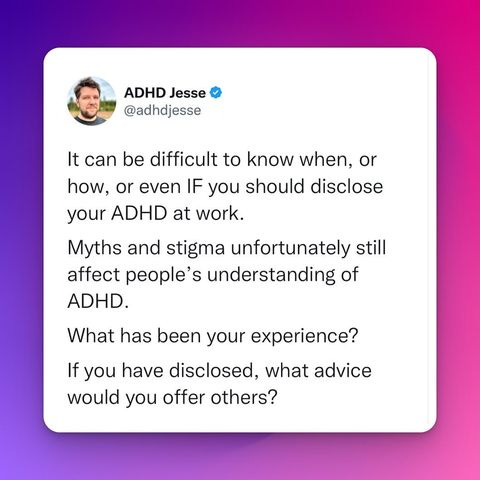Reader Q&A: Disclosing ADHD at Work, Strategies for RSD, and Time/Energy Management as a Creative
❓Answering questions about ADHD, life, etc
Hey friends,
Last week, I asked people to submit their burning ADHD questions which I’m going to answer in this (hopefully semi-regular) reader Q&A. If you want to support me by signing up to be a paid subscriber, that would be amazing. 💙 For bonus content, I did a couple extra questions for paid subscribers at the end.
Let’s dive in!
Topics covered in this issue:
Rejection Sensitive Dysphoria
Disclosing ADHD at work
Parenting with ADHD
Managing multiple projects as a creative
Internal vs external hyperactivity
[What are some] tactics to handle RSD (Rejection Sensitive Dysphoria)? — Zach F.
For those unfamiliar with RSD, I actually have a video that dives into this a bit more and shares some tactics that I’ve found helpful.
Ultimately, I don’t think there is a magic solution that “fixes” RSD.
Some tactics I’ve found to be helpful:
Literally calling it out when you see it. Communicate about RSD with those you are most likely to experience RSD around (partners, family, etc). When it happens, the intense feelings you experience are real, and having someone try to downplay them or tell you to calm down will often only make the situation worse. Plus, if they know about RSD, you can say out loud (perhaps through gritted teeth) something like, “I’m feeling rejected/betrayed right now, but I think it’s RSD. Can we take a break?” You might not be able to be eloquent or polite, but you may be able to escape an RSD flare up without doing or saying something you later regret.
Give it some space. Related to the last one, the feelings of RSD often (but not always) fade quickly with time. So taking a break from the conversation, pausing before you respond, any amount of space you can give from the situation to your reaction will only help you to have a better grasp on the entire situation.
[What are some] strategies for disclosing ADHD at work—and how to decide whether to do so in the first place? — Sonja
This is a tough one with no easy answer. It really depends a lot on your specific situation and likely your relationship with your manager.
If you are in a situation where you feel like you can disclose without repercussion, I do think it can really help improve your work environment and help explain why you do things differently. For me, disclosing was helpful for my manager and I to figure out better ways of working together (and explain some of the difficulties we’d had previously).
Unfortunately, it seems like many stories of people disclosing their ADHD have not been positive.
Many experience negative consequences and possibly even job loss as a result. Some industries in particular even have strict policies that may affect your employment if they find out you have ADHD, so that is something to consider as well. My understanding is disclosure of an ADHD diagnosis isn’t required in most countries, so it’s something that needs to be weighed carefully on an individual basis. (I’m not a lawyer and this isn’t legal advice).
It’s seriously disappointing that so much stigma and misunderstanding of ADHD still exists. My hope is the work I (and so many other amazing advocates) do can help spread the positive word about what ADHD really is, and help others know how they can support their peers with ADHD rather than judge them harshly.
I asked on Twitter and Instagram about ADHD disclosure at work and it’s worth reading through the replies to see what other people have experienced:
“[When parenting with ADHD], how to make sure everything gets done and how to parent an ADHD child (while having it myself).” — Josh G.





